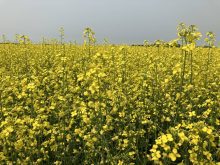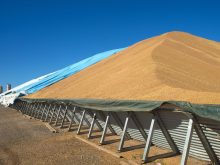One of the two resolutions that made the rounds at the 2021 annual general meetings of Saskatchewan’s crop commissions appears to be alive and kicking, while the other is dead.
The commissions continue to collectively lobby the federal government to implement weekly reporting of cumulative grain exports, similar to what happens in the United States.
SaskCanola chair Bernie McClean said there is still no weekly report in place a year after the resolution was passed.
“We’re obviously not there yet. All things policy take time,” he said.
Read Also

New coal mine proposal met with old concerns
A smaller version of the previously rejected Grassy Mountain coal mine project in Crowsnest Pass is back on the table, and the Livingstone Landowners Group continues to voice concerns about the environmental risks.
“If I have learned anything in (my) seven years with SaskCanola, you’ve got to be patient.”
McClean said the good news is that the commissions have received the backing of a powerful ally in their effort to increase transparency in the grain trade.
Saskatchewan agriculture minister David Marit’s office has informed the farm group that the province endorsed its request in the submission it made to Ottawa regarding proposed amendments to the Canada Grain Act.
McClean read out loud to farmers what the province said in its submission.
“Our government supports the request of producers to implement a mandatory federal reporting of sales, which would help producers make an informed marketing decision,” he said.
Shaun Dyrland, chair of Saskatchewan Pulse Growers, said the commissions each made their own submissions to the review in April 2021 supporting mandatory reporting of sales over a certain daily volume and weekly reporting of cumulative sales.
“The 2021 federal election delayed the government’s next steps on the Canada Grain Act review but we expect this to pick up now in the new year,” he said.
“SPG will continue to press for action on the creation of a sales reporting system.”
The update on the second 2021 resolution calling for farmers to be rewarded for their carbon sequestration efforts wasn’t as cheery.
“Both federal and provincial governments have advised that zero till will not be eligible for carbon offset credits within a regulated offset system,” said Dyrland.
“Governments have told us that an activity is no longer eligible for offset credits once it passes a threshold of 40 percent adoption.”
An estimated 75 percent of Saskatchewan farmers have adopted zero-till practices.
Dyrland said Saskatchewan crop commissions have engaged a government relations firm to assist them with strategy and advocacy surrounding carbon policy so they can get out front on future issues.
“We plan to continue to advocate on carbon policy topics on behalf of producers in the coming year,” he said.
McClean expressed frustration with the government responses.
“What is becoming apparent is that the current offset protocols are not designed to meet the needs of farmers,” he said.
“They’re designed for other industries and there does not seem to be the political will to make them work for farmers.”
He said the commissions will continue to promote acceptance of modern farming practices in private market carbon offset programs.


















